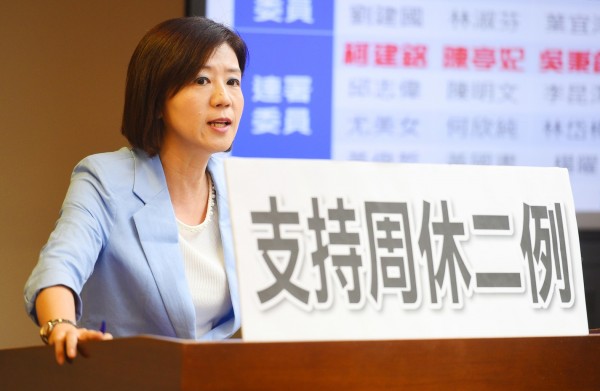《TAIPEI TIMES 焦點》 KMT’s workweek proposal passed by committee

Chinese Nationalist Party (KMT) Legislator Alicia Wang yesterday speaks at a legislative committee meeting in Taipei in favor of legislation to enforce a five-day work week. Photo: Chang Chia-ming, Taipei Times
By Abraham Gerber / Staff reporter
A bill requiring two weekly fixed days off (兩例) yesterday passed an initial review by the legislature’s Social Welfare and Environmental Hygiene Committee, even though opposition legislators questioned the ability of the Ministry of Labor to enforce its proposal to require “one fixed day off and one flexible rest day” (一例一休).
The bill sponsored by Chinese Nationalist Party (KMT) Legislator John Wu (吳志揚) passed with only five of the committee’s 15 legislators present.
It now moves to the general assembly, where cross-party talks are likely to reconcile it with the Executive Yuan’s proposed bill.
While the three KMT lawmakers at the meeting passed a motion for the proposal to avoid cross-caucus negotiations, a petition by legislators in the general assembly can still force such talks.
“We hope to truly and fully realize a five-day workweek in the future,” said KMT Legislator Alicia Wang (王育敏), who set the committee agenda as this week’s rotating convener. “One fixed day off and one flexible rest day would not be a truly progressive law.”
Wu’s proposal would bar workers from working on their fixed days off except in a crisis or emergency, although they could work on their flexible rest day if employers provide overtime pay or compensatory rest time.
In response to lawmakers’ questions, Minister of Labor Kuo Fong-yu (郭芳煜) told the committee that the government’s “one fixed day off and one flexible rest day” proposal would guarantee reduced work hours when combined with the ministry’s plans to increase overtime pay, cut monthly overtime allowances and strengthen labor inspections.
Opposition legislators and labor groups have said the ministry’s plans are too complicated.
“We need to return to the purpose of the five-day workweek, which is to remedy the long-term overwork that Taiwan’s workers have suffered — the focus should be on ensuring that workers can rest, not overtime pay levels,” the KMT lawmaker said, adding that some employers had reacted to the 40-hour week requirements by cutting pay and benefits.
“We want to get to the root of the problem by issuing a simple rule guaranteeing workers two days off every week,” Wu said.
“It is a pity that realizing a 40-hour workweek has become so complicated,” Taiwan Confederation of Trade Unions general secretary Tai Kuo-jung (戴國榮) said.
He was one of several union and labor leaders who were invited by KMT and New Power Party lawmakers to speak to the committee.
“We believe that any ‘consensus’ reached between employers and employees for overtime on the flexible rest day will be fake — employers can use evaluations and promotions to force employees to except overtime, even if they are unwilling,” Tai said.
“What workers really care about is having days off that they can use flexibly,” Democratic Progressive Party Legislator Chung Kung-chao (鍾孔炤) said, calling for workers’ annual leave to be increased in lieu of having two fixed days off.
Even if final legislation requires two fixed days off, employers could require workers to separate their weekly days off for scheduling convenience, while many workers would lose substantial overtime pay, plus it would be difficult to enforce, he said.
新聞來源:TAIPEI TIMES














